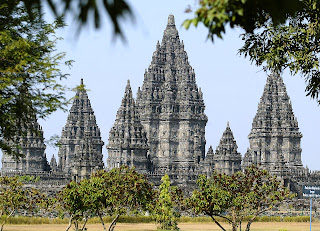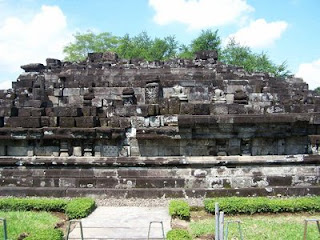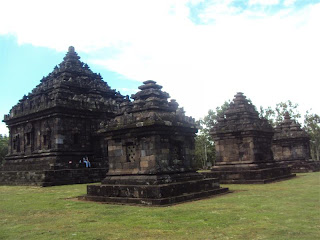Archaeological Sights
Exploring A Thousand Years Old Temples in Yogyakarta
As a famous archaeotourism
destination, Yogyakarta is a paradise for exploring a thousand years old
temples and finding the ruins of the "enigmatic missing
civilizations". Candi (ancient temples). Candi is ancient archeological
structure constructed during 7th-9th century aimed for a specific religion
(Buddhist or Hindu). It was constructed from hundreds of volcanic or river
stone blocks and assembled solely by human labor. Candi walls is often carved
with reliefs depicting stories, and a stone God or Goddess statue usually sits
at the center.
There are several candi located
in Yogyakarta and it's proximity. Borobudur, one of famous candi is in Magelang,
not far from Yogyakarta. Prambanan, also a well-known candi is in the
Yogyakarta-Central Java border area.
 |
| Borobudur, The Biggest Buddhist Temple in the Ninth Century |
Borobudur, The Biggest Buddhist Temple in the Ninth Century
Address: Borobudur, Magelang,
Jawa Tengah, Indonesia
GPS Coordinate: S7°36'28.3"
E110°12'13.5"
Borobudur is the biggest Buddhist
temple in the ninth century measuring 123 x 123 meters. It is located at
Magelang, 90-km southeast of Semarang, or 42-km northwest of Yogyakarta.
Borobudur temple is the one of the best-preserved ancient monument in Indonesia
that are most frequently visited by over a million domestic as well as foreign
visitors. It also had been acclaimed by the world as a cultural heritage main
kind. The architectural style has no equal through out the world. It was
completed centuries before Angkor Wat in Kamboja. Borobudur is one of the world's
most famous temples; it stands majestically on a hilltop overlooking lush green
fields and distant hills. Borobudur is built of gray andesite stone. It rises
to seven terraces, each smaller than the one below it. The top is the Great
Stupa, standing 40 meters above the ground. The walls of the Borobudur are
sculptured in bas-reliefs extending over a total length of six kilometers. It
has been hailed as the largest and most complete ensemble of Buddhist relieves
in the world, unsurpassed in artistic merit and each scene an individual
masterpiece.
 |
| Prambanan, The Most Beautiful Hindu Temple in the World |
Prambanan, The Most Beautiful Hindu Temple in the World
Address: Jalan Raya Jogja - Solo
Km 16 Prambanan, Sleman, Yogyakarta 55571, Indonesia
GPS Coordinate: S7°45'7.1"
E110°29'28.1"
Prambanan Temple is locally known
as the Roro Jonggrang Temple, or the Temple of the “Slender Virgin”, it is the
biggest and most beautiful Hindu temple in Indonesia. The temple complex of
Prambanan lies among green fields and villages. It has eight shrines, of which
the three main ones are dedicated to Shiva, Vishnu and Brahma. The main temple
of Shiva rises to a height of 130 feet and houses the magnificent statue of
Shiva’s consort, Durga. There are 224 temples in the complex; three of them,
the main temples are Brahma Temple in the north, Vishnu Temple in the south,
and the biggest among the three which lies between Brahma and Vishnu temples is
Shiva Temple (47 meters high).
 |
| Plaosan Temple, The Twin Temple in Yogyakarta |
Plaosan Temple, The Twin Temple in Yogyakarta
Address: Dukuh Plaosan, Desa
Bugisan, Prambanan, Jawa Tengah 57454, Indonesia
GPS Coordinate: S7°44'33.5" E110°30'16.7"
GPS Coordinate: S7°44'33.5" E110°30'16.7"
Plaosan founded in the 9th
century AD by the king and the queen named Rakai Pikatan and Pramudya Wardhani.
Rakai Pikatan was the sixth king of the genealogy of the kings who ruled Old
Mataram Kingdom from Sanjaya Buddhist Dynasty around the year 847 until 856 AD.
While the Queen, Pramudya Wardhaniis the daughter of Samaratungga from
Syailendra Buddhist Dynasty.
 |
| King Boko Palace, the Glory on a Peaceful Hill |
King Boko Palace, the Glory on a Peaceful Hill
Address: Jalan Raya Jogja-Solo,
Prambanan, Yogyakarta, Indonesia
GPS Coordinate: S7°46'17.9" E110°29'24.9"
GPS Coordinate: S7°46'17.9" E110°29'24.9"
Ratu Boko is an archaeological
site known to modern Javanese as Kraton Ratu Boko or Ratu Boko’s Palace. Ratu
Boko is located on a plateau, about three kilometres south of Lara Jonggrang
Prambanan temple complex in Yogyakarta Indonesia. The original name of this
site is still unclear, however the local inhabitants named this site after King
Boko, the legendary king mentioned in Lara Jonggrang folklore. If you enter
from the palace gateway, you will directly be guided to the center part. Two
high gates will welcome you. The first gate has three entrances while the
second one has five.
Kedulan Temple, Revealing the Puzzle of the Ancient Dam nearby Kedulan Temple
Address: Kalasan, Sleman,
Yogyakarta, Indonesia
GPS Coordinate: S7°44'12.7" E110°28'13.2"
GPS Coordinate: S7°44'12.7" E110°28'13.2"
Kedulan temple is a Hindu-style
temple located in the hamlet Kedulan, approximately 3 kilometers from Kalasan.
This temple was accidentally discovered by miners sand on 24 November 1993.
Distinct pleasure would be obtained if visiting this temple, because you can
enjoy the process of reconstruction of the temple is very complicated. 7 meter
deep excavation will immediately encountered upon arriving at this temple
complex. Excavation site contains the temple stones were scattered in all
directions and the distance of the main temple that looks still together. In
this excavation Kedulan temple complex consisting of one main temple and three
ancillary temples (companion) originally stood. Now, the foot of the main
temple is being tested in order to be boarded kekokohannya other stones at a
later stage.
Ijo Temple, the Temple Located at the Highest Place in Yogyakarta
Address: Bukit Ijo, Desa
Sambirejo, Prambanan, Sleman, Yogyakarta, Indonesia
GPS Coordinate: S7°47'2.2" E110°30'44.2"
GPS Coordinate: S7°47'2.2" E110°30'44.2"
Going along the street leading to
the southern part of Queen Boko Palace complex is such an exciting journey,
especially for cultural tourism lovers. The reason is that there are so many
temples mushrooming in that area. One of them that is rarely talked about is
Candi Ijo or Ijo Temple; one temple of which location is the highest compared
to other temples in Yogyakarta. Ijo Temple was built in around the ninth
century on a hill named the Green Hill of which height is 410 meters above the
sea level. Because of this height, we can enjoy not only the temple but also
natural view below such as terraces of agriculture land with its steep slope.
Even though this is not a fertile area, natural view around the temple is so beautiful
to enjoy.


0 Response to "Exploring A Thousand Years Old Temples in Yogyakarta"
Post a Comment